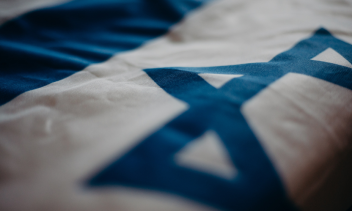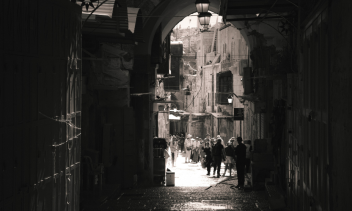Our mourning on Tisha B’Av is less about the Beit HaMikdash’s absence and more about the significance of that absence. That was something Rabbi Josh Grajower shared in his 18Forty episode, and it reflects a pathway to a more meaningful Tisha B’Av. We may not have sat in the courtyards of a built Jerusalem, but we have lived through the consequences of not having one. We selected three teachings about the changes exile wrought upon the Jewish People. Some impacted God, some affected society, and others impacted the nation.
1. Avodah Zarah 3b: God Lost, Too
In classic Talmudic fashion, Masechet Avodah Zarah’s early pages introduce aggadic passages into its discussions. The tractate’s opening pages center around how the non-Jewish nations will be in Messianic days. In the midst of that, the Gemarah makes an off-hand comment that God will only be happy or playful—however the term “schok” is understood—when those days arrive. Then, an interesting discussion about God’s daily schedule unfolds, and it highlights the impact exile had on the One Who allowed it to happen.
א”ר יצחק אין לו להקב”ה שחוק אלא אותו היום בלבד איני והא אמר רב יהודה אמר רב שתים עשרה שעות הוי היום שלש הראשונות הקב”ה יושב ועוסק בתורה שניות יושב ודן את כל העולם כולו כיון שרואה שנתחייב עולם כלייה עומד מכסא הדין ויושב על כסא רחמים שלישיות יושב וזן את כל העולם כולו מקרני ראמים עד ביצי כנים רביעיות יושב ומשחק עם לויתן שנאמר (תהלים קד, כו) לויתן זה יצרת לשחק בו אמר רב נחמן בר יצחק עם בריותיו משחק ועל בריותיו אינו משחק אלא אותו היום בלבד
Rabbi Yitzḥak says: There is no making sport for the Holy One, Blessed be He, but on that day alone. The Gemara asks: Is that so? Is there no making sport for the Holy One, Blessed be He? But doesn’t Rav Yehuda say that Rav says: There are twelve hours in the day. During the first three, the Holy One, Blessed be He, sits and engages in Torah study. During the second three hours, He sits and judges the entire world. Once He sees that the world has rendered itself liable to destruction, He arises from the throne of judgment and sits on the throne of mercy, and the world is not destroyed.During the third set of three hours, the Holy One, Blessed be He, sits and sustains the entire world, from the horns of wild oxen to the eggs of lice. During the fourth three hours, He sits and makes sport with the leviathan, as it is stated: “There is leviathan, whom You have formed to sport with” (Psalms 104:26). Evidently, God makes sport every day, not only on that one day. Rav Naḥman bar Yitzḥak says in explanation: He makes sport with His creations, just as He sports with the leviathan; He does not make sport of His creations but on that day alone
א”ל רב אחא לרב נחמן בר יצחק מיום שחרב בית המקדש אין שחוק להקב”ה ומנלן דליכא שחוק אילימא מדכתיב (ישעיהו כב, יב) ויקרא ה’ אלהים צבאות ביום ההוא לבכי ולמספד ולקרחה וגו’ דלמא ההוא יומא ותו לא אלא דכתיב (תהלים קלז, ה) אם אשכחך ירושלם תשכח ימיני תדבק לשוני לחכי אם לא אזכרכי דלמא שכחה הוא דליכא אבל שחוק מיהא איכא אלא מהא (ישעיהו מב, יד) החשיתי מעולם אחריש אתאפק וגו
Rav Aḥa said to Rav Naḥman bar Yitzḥak: From the day the Temple was destroyed, there is no longer any making sport for the Holy One, Blessed be He. And from where do we derive that there is no making sport? If we say that it is from that which is written: “And in that day did the Lord, the God of hosts, call to weeping, and to lamentation, and to baldness and to girding with sackcloth” (Isaiah 22:12), that is inconclusive: Perhaps that day alone was called for weeping and lamentation, and no additional days. Rather, you might suggest that the source is that it is written: “If I forget you, O Jerusalem, let my right hand forget her cunning. Let my tongue cleave to the roof of my mouth, if I do not remember you” (Psalms 137:5–6). This is also inconclusive, as perhaps there is no forgetting of Jerusalem for God, but in any event there is still making sport. Rather, it is derived from this verse: “I have long time held My peace, I have been still, and refrained Myself; now will I cry like a travailing woman, gasping and panting at once” (Isaiah 42:14).
2. Sotah 49a-b: Jewish Society’s Collapse
We turn to Masechet Sotah to witness another change brought by exile, this one targeting Jewish society.
תָּנוּ רַבָּנַן רַבִּי פִּנְחָס בֶּן יָאִיר אוֹמֵר מִשֶּׁחָרַב בֵּית הַמִּקְדָּשׁ בּוֹשׁוּ חֲבֵרִים וּבְנֵי חוֹרִין וְחָפוּ רֹאשָׁם וְנִדַּלְדְּלוּ אַנְשֵׁי מַעֲשֶׂה וְגָבְרוּ בַּעֲלֵי זְרוֹעַ וּבַעֲלֵי לָשׁוֹן וְאֵין דּוֹרֵשׁ וְאֵין מְבַקֵּשׁ וְאֵין שׁוֹאֵל עַל מִי לָנוּ לְהִשָּׁעֵן עַל אָבִינוּ שֶׁבַּשָּׁמַיִם רַבִּי אֱלִיעֶזֶר הַגָּדוֹל אוֹמֵר מִיּוֹם שֶׁחָרַב בֵּית הַמִּקְדָּשׁ שָׁרוֹ חַכִּימַיָּא לְמֶהֱוֵי כְּסָפְרַיָּא וְסָפְרַיָּא כְּחַזָּנַיָּא וְחַזָּנַיָּא כְּעַמָּא דְאַרְעָא וְעַמָּא דְאַרְעָא אָזְלָא (וְדַלְדַּלָהּ) [וְנָוְולָה] וְאֵין שׁוֹאֵל וְאֵין מְבַקֵּשׁ עַל מִי יֵשׁ לְהִשָּׁעֵן עַל אָבִינוּ שֶׁבַּשָּׁמַיִם
The Sages taught: Rabbi Pineḥas ben Ya’ir says: From the time when the Second Temple was destroyed, the ḥaverim and free men of noble lineage were ashamed, and their heads were covered in shame, and men of action dwindled, and violent and smooth-talking men gained the upper hand, and none seek, and none ask, and none inquire of the fear of Heaven. Upon whom is there for us to rely? Only upon our Father in Heaven. Rabbi Eliezer the Great says: From the day the Second Temple was destroyed, the generations have deteriorated: Scholars have begun to become like scribes that teach children, and scribes have become like beadles, and beadles have become like ignoramuses, and ignoramuses are increasingly diminished, and none ask and none seek. Upon whom is there to rely? Only upon our Father in Heaven.
3. Moed Katan 26a: Mourning Our Loss
When one sees the ruins of Jerusalem today—assuming it is the first time in a long time—they must rip their garments. Many do, in fact, do this, albeit wearing an I-don’t-mind-if-this-gets-ruined shirt. Still, it’s meant to impact us. We cannot see the Kotel, see what was, and not feel an impact. If not in our hearts, then on our sleeves.
עָרֵי יְהוּדָה מְנָלַן — דִּכְתִיב: ״וַיָּבֹאוּ אֲנָשִׁים מִשְּׁכֶם מִשִּׁילוֹ וּמִשֹּׁמְרוֹן שְׁמוֹנִים אִישׁ מְגוּלְּחֵי זָקָן וּקְרוּעֵי בְגָדִים וּמִתְגּוֹדְדִים וּמִנְחָה וּלְבוֹנָה בְּיָדָם לְהָבִיא בֵּית ה׳ וְגוֹ׳״. אָמַר רַבִּי חֶלְבּוֹ אָמַר עוּלָּא בִּירָאָה אָמַר רַבִּי אֶלְעָזָר: הָרוֹאֶה עָרֵי יְהוּדָה בְּחוּרְבָּנָן, אוֹמֵר: ״עָרֵי קדְשְׁךָ הָיוּ מִדְבָּר״, וְקוֹרֵעַ. יְרוּשָׁלַיִם בְּחוּרְבָּנָהּ, אוֹמֵר: ״צִיּוֹן מִדְבָּר הָיָתָה יְרוּשָׁלִַם שְׁמָמָה״, וְקוֹרֵעַ. בֵּית הַמִּקְדָּשׁ בְּחוּרְבָּנוֹ, אוֹמֵר: ״בֵּית קדְשֵׁנוּ וְתִפְאַרְתֵּנוּ אֲשֶׁר הִלְלוּךָ אֲבוֹתֵינוּ הָיָה לִשְׂרֵיפַת אֵשׁ וְכל מַחֲמַדֵּינוּ הָיָה לְחרְבָּה״, וְקוֹרֵע
From where do we derive that one must rend his garments upon seeing the cities of Judea in ruin? As it is written: “There came certain men from Shechem, from Shiloh, and from Samaria, eighty people, their beards shaven, and their clothes rent, and having cut themselves, with offerings and incense in their hand, to bring to the house of the Lord” (Jeremiah 41:5). This indicates that they rent their garments upon seeing the destruction. Rabbi Ḥelbo said that Ulla Bira’a said that Rabbi Elazar said: One who sees the cities of Judea in their desolation says: “Your sacred cities are become a wilderness” (Isaiah 64:9), and then rends his garments. One who sees Jerusalem in its desolation says: “Zion is a wilderness, Jerusalem a desolation” (Isaiah 64:9), and then rends his garments. One who sees the Temple in its desolation says: “Our sacred and our beautiful house, where our fathers praised You, is burned with fire; and all our pleasant things are laid waste” (Isaiah 64:10), and then rends his garments.
קוֹרֵעַ עַל מִקְדָּשׁ, וּמוֹסִיף עַל יְרוּשָׁלַיִם. וּרְמִינְהוּ: אֶחָד הַשּׁוֹמֵעַ וְאֶחָד הָרוֹאֶה, כֵּיוָן שֶׁהִגִּיעַ לְצוֹפִים — קוֹרֵעַ, וְקוֹרֵעַ עַל מִקְדָּשׁ בִּפְנֵי עַצְמוֹ וְעַל יְרוּשָׁלַיִם בִּפְנֵי עַצְמָהּ! לָא קַשְׁיָא: הָא דְּפָגַע בַּמִּקְדָּשׁ בְּרֵישָׁא. הָא דְּפָגַע בִּירוּשָׁלַיִם בְּרֵישָׁא
It was taught in the baraita: He first rends his garments for the Temple and then extends the rent for Jerusalem. And they raise a contradiction from another baraita that states: Both one who hears that Jerusalem is in ruin and one who sees the destruction, once he reaches Mount Scopus [Tzofim], rends his garments. And he rends his garments for the Temple separately and for Jerusalem separately. The Gemara answers: This is not difficult. This baraita, which states that instead of making a separate rent for Jerusalem one may extend the first rent that he had made for the Temple, is referring to the case where one reached the Temple first, before seeing the rest of Jerusalem, and saw it in ruin. That baraita, which states that one must make separate rents for Jerusalem and for the Temple, is referring to the case where one reached Jerusalem first, and only afterward the Temple.
Postscript: Living in Exile
God spends hours weeping. Jewish society deteriorated. Seeing Israel evokes mourning. Exile is meant to animate life as we know it. The way existence operates—from the chambers of heaven to the streets of New York—was changed because of the Beit HaMikdash’s destruction. The psalmist writes in powerful imagery and tone (Tehillim 137:1-4):
On the rivers of Bavel, there we sat, also we cried, by remembering Zion.
On the polars, we hung our lyres.
Because there our captors asked us for words of song, our tormentors for amusement: “Sing for us a song from Zion.”
How will we sing Hashem’s song on foreign land?
Reflecting on the consequences of exile offers us a peg to grasp on Tisha B’Av. It gives us life experiences to attach to the day, to mourn with our fellow Jews for our collective loss.








